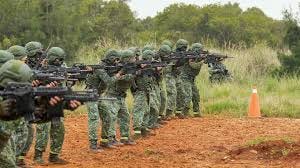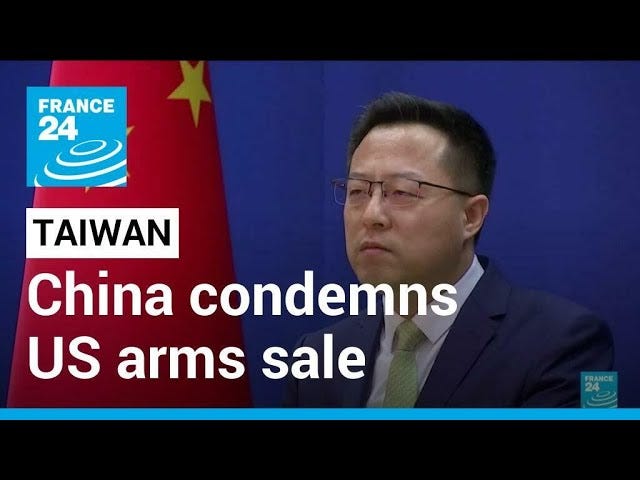What does China want from Nancy Pelosi?
Pelosi's visit to Taiwan has the potential to deteriorate into a full-blown Sino-US war. It would end with American aircraft carriers at the bottom of the sea.
Hi Kids,
I’m back and better than ever and here to talk to you folks today about China and Taiwan. Will House Speaker Nancy Pelosi’s spark a nuclear war with her visit to Taipai? What does Beijing want? Who would prevail in such a war?
Bear with me. First of all, some background:
1)Taiwan was founded in 1949 by Chiang Kai-Shek after losing the Chinese Civil War to Mao Zedong’s Communist Party. Ever since, China has put recovering what it views as a breakaway province as its highest national priority.
It’s important to highlight that nothing is more important to Beijing than recovering Taiwan; this issue trumps other factors such as the economy and foreign relations.
2)This is due to two reasons: First, Democratic Taiwan drives a stake into the legitimacy of the authoritarian Chinese Communist Party (CCP) across the Bay; a thriving, western country that rejects Chairman Mao and everything he stood for.
More importantly, there’s nothing that terrifies the CCP more than rebellious regions that refuse to recognize the central government as sovereign. Regime stability is a critical issue in a country characterized by endless civil war over the past 3000 years, with 56 ethnic groups speaking no less than 302 different languages.
3) To quote David P. Goldman, arguably the sharpest China analyst alive today, “Beijing insists on sovereignty over Taiwan not because the island has a strategic utility, nor because it wants to suppress its democratic system, but because the integrity of China’s territory is an existential question for the Chinese state. The only alternative to the status quo is a war that no one would win.”
4) During the first two decades post-independence, the United States supported Taiwan as part of its Cold War doctrine of promoting Democracies globally. This changed in the 1970s.
Realizing that China and the Soviet Union were at each other's throats, Washington established diplomatic relations with the former as a means to split the Communist bloc and ‘flip’ Russia’s traditional geopolitical foe.
5) Seeking rapprochement with authoritarian China while remaining committed to Democratic Taiwan, the US adopted the ‘One China Policy’. Characterized by strategic ambiguity, this doctrine saw Washington recognize the People’s Republic of China (PRC) as the sole representative government and sever diplomatic relations with Taiwan.
At the same time, Congress passed the Taiwan Relations Act, mandating that the US provide Tapei with defensive weapons in order for it to be able to protect itself.
6) The US has remained committed to this delicate dance ever since. On one hand, refusing to recognize Taiwan’s independence while maintaining flourishing unofficial relations and selling the island nation advanced weapons.
Critically, a slew of presidents have hinted that the United States would intervene militarily to protect Taiwan from an future Chinese invasion. This both deterred Beijing while demonstrating Washington's traditional commitment to promoting liberal democracies worldwide.
7) It’s important to highlight that China finds Washington’s support of its ‘rebellious territory’ deeply offensive. Beijing strongly opposes weapons sales and American presidents have never visited Taiwan or even interacted with their Taiwanese counterparts for fears of irreparably harming Sino-US ties.
8) Washington’s support for Taiwan was put to the test in 1996 after the People’s Liberation Army held a series of military exercises that suggested an invasion was imminent. Then-President Bill Clinton acted decisively, dispatching two carrier battle groups to the Taiwan Strait and demonstrating America’s commitment to its democratic ally.
China was forced to back down in the face of overwhelming military might, deeply humiliating a nation that views itself as a historic superpower. Making the confrontation even more painful was the visit a year later by House Speaker Newt Gingrich.
As second in the presidential line of succession, Gingrich was the most senior US official to visit Taipai. China viewed the delegation as de-facto recognition of Taiwan and an egregious breach of previous diplomatic understandings.
9) This confrontation led Beijing to embark on a major military buildup designed to prevent the United States from deploying naval power in a future Taiwan crisis. Known as ‘Anti Area Access Denial’, or A2/AD, this doctrine focuses on erecting a defensive array of UAVs, submarines, anti-ship ballistic missiles, and maritime mines that would send Navy carrier groups to the bottom of the sea.
A2/AD is contrary to the traditional Navy role of projecting power on the open seas and securing trade routes. And indeed, the multi-decade arms race has led to the current situation in which the US stands to lose thousands of troops along with its most advanced platforms should it intervene in the South China Sea.
10) A war with China is likely to result in a resounding US defeat. Beijing would unleash a crippling cyberattack on the Pentagon’s command-and-control systems, communications nodes, and military bases worldwide.
Guam would be decimated by ballistic missile strikes; China would then eliminate US commercial, spy and military satellites in orbit using sophisticated anti-satellite weapons and sink American aircraft carriers with its DF-21 anti-ship missile.
Any one of the aforementioned events actually occurring would have far-reaching repercussions on America's status as a superpower, the strength of the dollar, and the national debt. It would result in regional US allies- Japan, South Korea, India, and even Australia- accepting China's hegemony and a race to cut their own deals with Beijing in an effort to be eaten last.
11) This estimate is not baseless fearmongering but the results of dozens of Pentagon war games that ended in a systematic US defeat. Making matters especially grave is the abysmal state of the US Navy.
The only service not to take an active role in the War on Terror, the Navy suffers from a lack of training, budgets, and a manpower shortage of over 9,000 sailors.
A 2021 report commissioned by Senator Tom Cotton and three GOP Congressmen found serious faults in the Navy’s warfighting capabilities, including a lack of readiness, a culture of corruption, and risk-averse leadership. One Pentagon exercise this past October simulating US-China war saw the PLA defeat American forces decisively, with one Admiral revealing that “they knew exactly what we’re going to do before we did it”.
12) As such, Nancy Pelosi’s visit in Taiwan provides China with an opportunity to make amends for the humiliation two decades ago. The first such delegation since Newt Gingrich’s groundbreaking summit in 1997, conditions today have changed drastically since Bill Clinton forced Beijing to fold like a cheap suit.
13) China is now wealthier, armed with powerful anti-access platforms and unwilling to bend to America’s will. At the same time, the US is wracked by internal strife, distracted by Russia’s invasion of Ukraine and suffering from the rare combination of inflation and recession.
President Biden is widely viewed as a weak leader suffering from advanced cognitive decline, and with almost no political base of support. His legislative agenda is dead on arrival, the Democratic Party is expected to be massacred in the upcoming midterm elections and the pullout from Afghanistan was an international debacle.
14) In addition, Chairman Xi is up for elections when the 20th Communist Party National Congress kicks off in the fall. Standing up to the "uncivilized barbarians" from the West is exactly what Xi needs to rally his fervently nationalist political base.
15) And indeed, China has amped up the saber-rattling ahead of Pelosi's visit. Warning that "all military options are on the table" and promising to "fight to the death", Beijing has massed warships, tanks and fighter jets.
16) Meanwhile, Pelosi, and the US by extension, cannot back down. Anything other than an official visit to Taiwan would signal weakness and Washington's acceptance of China's dominance over the South China Sea.
This is the last thing the US needs, following a disastrous withdrawal from Afghanistan and a Russian invasion of Ukraine that has left its major allies wondering if America can truly be trusted.
17) The confluence of factors along with the accompanying historical baggage has led to a situation in which confrontation is the best possible option for both sides. Things can get very scary, very quickly.
18) Finally, the geopolitical analyst Graham Allison famously coined the ‘Thucydides Trap’, a prediction that war is the inevitable consequence of a rising power that threatens to displace a ruling one. It very well may be that China and the US are hurtling towards open conflict, be it over Pelosi’s visit or Beijing’s invasion of Taiwan.
As strong as the US may be on the world stage, the bottom line is that it has been a superpower for a little over 80 years. That’s nothing in the grand scheme of things.
Rome lasted a millennium; the Ottoman Empire ruled supreme for 600 years while Ancient Greece dominated the northeastern Mediterranean for 350. 80 years is not even a small pixel in world history.
I hope I'm wrong but it could be that the American experiment is coming to an end. The decline can be long and arduous, as was with the Ottoman Empire, or it can happen as Ernest Hemingway described bankruptcy- “gradually, and then suddenly”.







